George Leveson-Gower, 2nd Earl of Granville (1815-1891)
© 2007
Armchair Travel Co. Ltd. - This page may be used for non-commercial purposes
ONLY!
![]()
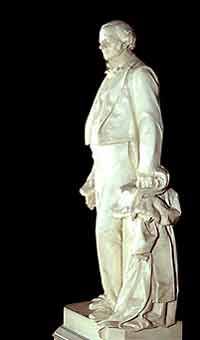
[ Play
Narrated and Animated Movie ! ] The House is a funny place, rather like a grown-up school; with plenty of jokes and fun under the upper current of serious business. We are not so busy tonight as it is not a Government night, but as a rule we all squash about the Lobby to prevent sleepy or hungry men going home to bed or to dinner. It is like the demons who get no rest themselves but make up for it by letting no one else get any.
George Leveson-Gower was the eldest son of the 1st Earl Granville. Sources have said that although he was no great orator or debater, he was good humoured and a very skilled businessman. In 1835 he worked under his father in the British Embassy in Paris. In 1836 he entered Parliament as the Whig member for Morpeth. In 1840 he became Undersecretary of State for Foreign Affairs, and carried this role through to Melbourne's administration of 1841. In 1846 on his father's death he succeeded to the peerage and made his first speech in the House of Lords on the abolition of the Corn Laws. In the same year he was appointed by Prime Minister Russell to Master of the Buckhounds. In 1848 he was made Vice-President of the Board of Trade and Paymaster of the Forces.
In 1851 Granville was admitted to the cabinet, and when Palmerston left the Foreign Office at the end of the year Granville took over and held the office until the Russell ministry fell in 1852. From 1852-1854 he became President of the Council under Aberdeen, and in 1855 was entrusted with the leadership of the Lords (when the Liberals were in office).
During this time, Granville had also been appointed as the Vice-President of the Royal Commission dealing with the preparations for the Great Exhibition. In 1851, on the success of the exhibition, Granville was invited to France and did much to promote Anglo-French relations. In 1856 he was despatched to St Petersburg as 'envoy extraordinary' in order to represent the queen at the coronation of Alexander II in Moscow. When Derby resigned in 1859 the queen turned to Granville because of her annoyance with the feuding between Palmerston and Russell. Granville tried but failed to form a strong enough administration, and so when Palmerston became the next Prime Minister Granville accepted office as Lord President of the Council.
In 1857 he was made a Knight of the Garter, and in 1862, Chairman of the Royal Commission for the exhibition of that year. In 1868 he was made Secretary of State for the Colonies in Gladstone's last administration. During his period in office he dealt with the Red River revolt, the transfer of territory from the Hudson Bay Co. to Canada, the neutrality of Belgium and the Treaty of Washington. During the following years as one of the main leaders of the opposition, Granville was openly highly critical of Disraeli's foreign policy.
In 1880 he was again sent for by the queen, but it seems she changed her mind as Gladstone was asked to form a ministry instead. Granville assumed the office of Foreign Secretary once again. It has been said that he was inefficient. To his credit he did help preserve the peace of Europe, but it seems that by nature he was too weak to handle the powerful European statesmen and ambassadors. In 1885 he resigned with the rest of the Liberal party. Although failing health prevented him from leading an exertive public life, he did however continue to lead his party in the House of Lords until his death in 1891.
[ Virtual
Tour ] [ Main Topics
Index ]
- Leveson-Gower in a letter to a friend, 1886.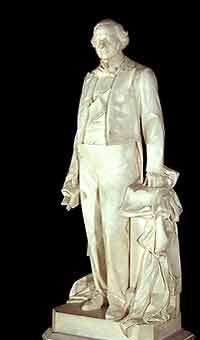
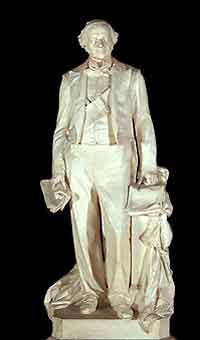
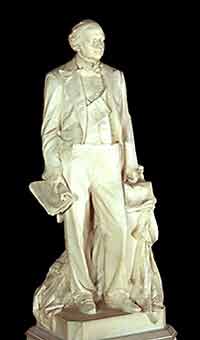
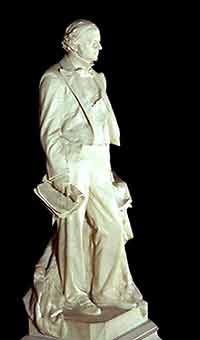
Additional Information on
George Leveson-Gower, 2nd Earl of Granville (1815-1891)
Explore-Parliament.net: Advanced Category Search
Keyword Categories:
_Politician
_Man
_Person
_Peer
_Artist_Thornycroft
_Object_Portrait
_Object_Artwork
_Object_Sculpture
_Granville